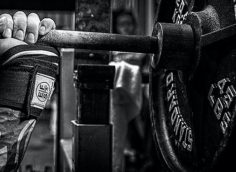Assuming you're not overtraining or have an injury of some kind, there are two things that will take you through a weakness: frequency and doing the thing you've been avoiding. Now, you already know how to increase frequency – work your weak links more often. So let's talk about the other strategy.
When Legs Are Your Weak Link
I remember talking to Branch Warren after qualifying for the Olympia, and he told me that if I wanted to place I'd have to start doing the thing I hated the most. In my case, that was high-rep leg work.
Up until then, I'd never gone over 8 reps and was always fairly strong, but my quads refused to grow. So I made a rule: for a whole 6 weeks there would be no set under 15 reps in my sessions. Some of those were drop sets, extended, or giant sets. Some were upwards of 50-100 reps. The puke bucket was always nearby. My quads, however, grew more than they had in the two years prior.
Amit Sapir, 495 Pounds for 15 Reps
The thing that made them grow wasn't the high reps, it was the fact that I gave my body a type of stimulation that it hadn't received before, and THAT was key to overcoming the growth plateau.
Or Do The Opposite
For many, the solution is the opposite of what I did. Others are used to working for the pump, so if they focus on low reps, heavy weight, and explosive movements they'll start to see more progress.
Frequency
Most people don't train hard enough or with enough volume to stimulate growth. Adding more sessions will automatically increase the volume and for many people (assuming technique is decent) this will reinforce good movement habits, increase efficiency, and improve muscular "awareness" during training.
Practice is essential. It forces you to train your weaknesses. And if you're smart, you'll incorporate different angles, tempos, exercises, grips, etc. and that will inevitably get you doing the things you don't usually do.
Now, when we're talking about strength and power, it's a little more complicated. Increased frequency can help in some cases and hurt in others. Strength isn't just about your muscular system; it's also dependent on your nervous system which burns out much more easily.





